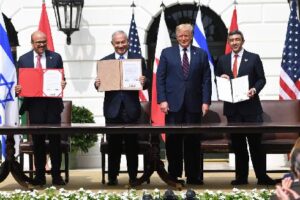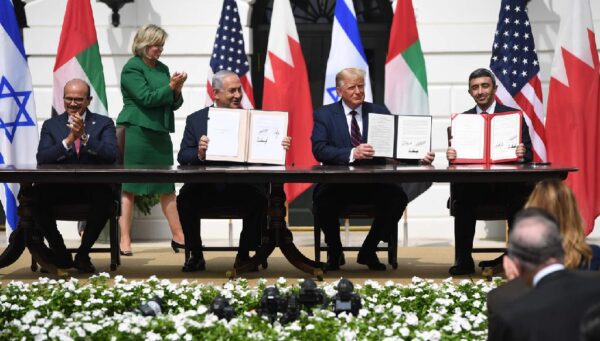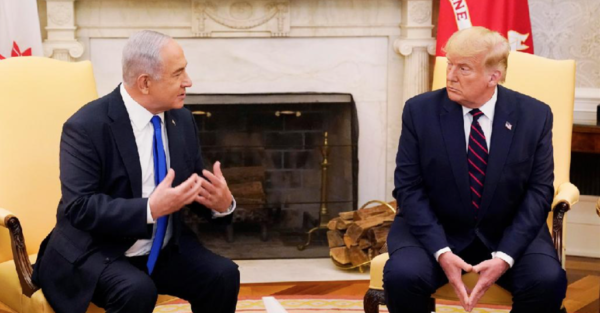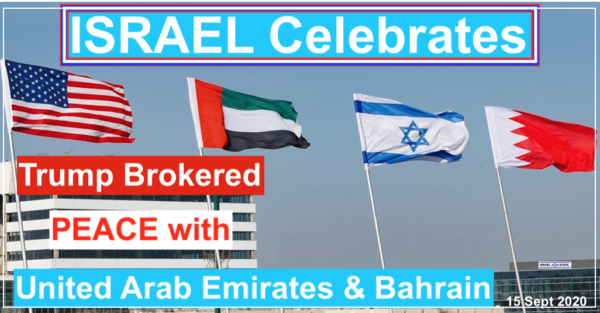
President Trump, “After decades of division and conflict, we mark the dawn of a new Middle East.”
PM Netanyahu, “This is a not a peace between leaders, but a peace among peoples.”
– As Gulf states become 3rd & 4th Arab states to sign treaties with Israel, Palestinian terrorists fire rockets from Gaza injuring 2 in southern Israel.
By Itamar Eichner, Associated Press
WASHINGTON, D.C. – Israel, the United Arab Emirates and Bahrain signed treaties on Tuesday as U.S. President Donald Trump hosted the landmark signing ceremony at the White House.
The two Gulf states become the third and fourth Arab nations to sign agreements with Israel, after Egypt in 1979 and Jordan in 1994.
“We’re here this afternoon to change the course of history,” Trump said from the balcony overlooking the South Lawn of the White House at the start of the ceremony. “After decades of division and conflict, we mark the dawn of a new Middle East.”
Calling it “a major stride in which people of all faiths and backgrounds live together in peace and prosperity,” the president said the three Middle East countries “are going to work together, they are friends.”
In an event aimed at showcasing presidential statesmanship, Trump was hosting more than 700 guests on the South Lawn to witness the sealing of the agreements.
“This is a pivot of history, a new dawn of peace,” Prime Minister Benjamin Netanyahu said as he took Trump’s place on the balcony. “This is a not a peace between leaders, but a peace among peoples.”
During the ceremony, Emirati Foreign Minister Abdullah bin Zayed Al Nahyan, the brother of Abu Dhabi’s powerful crown prince, thanked Israel for “halting the annexation of Palestinian territories,” although Netanyahu has insisted that Israel has only temporarily suspended its plans to annex West Bank settlements.

L-R: Bahraini FM Abdullatif bin Rashid Alzayani, PM Benjamin Netanyhau, U.S. President Donald Trump and Emirati FM Abdullah bin Zayed Al Nahyan at the White House signing ceremony – Screenshot
“Today, we are already witnessing a change in the heart of the Middle East — a change that will send hope around the world,” Al Nahyan said.
Bahrani Foreign Minister Abdullatif al-Zayani said his country would stand with the Palestinians.
“Today is a truly historic occasion,” he said. “A moment for hope and opportunity.”
He added: “Today’s agreement is an important first step and it’s now incumbent upon us” to follow up with an Israeli-Palestinian peace deal.
“We have shown today that such a path is possible, even realistic. What was only dreamed of a few years ago is now achievable, and we can see before us a golden opportunity for peace, security, and prosperity for our region.”
The president and his allies hope the occasion will burnish his credentials as a peacemaker at the height of his reelection campaign ahead of the November presidential elections.

Benjamin Netanyahu and Donald Trump in the Oval Office on Tuesday – Photo: AP
Meeting Netanyahu earlier in the Oval Office, Trump said, “We’ll have at least five or six countries coming along very quickly” to forge their own accords with Israel, but did not name any of the nations involved in such talks.
“This can lead to peace, real peace, in the Middle East,” Trump said as he welcomed Al Nahyan.
Surrounded by flags from all four nations, Netanyahu and the Emirati and Bahraini foreign ministers then each signed the agreements in English, Hebrew and Arabic, in front of a crowd that included representatives of supporting nations from the Washington-based diplomatic corps but few other dignitaries from overseas.
Some congressional Democrats who have offered muted praise were invited to attend.
In addition to the individual bilateral agreements signed by Israel, the UAE and Bahrain, all three signed a trilateral document dubbed the “Abraham Accords” after the patriarch of the world’s three major monotheistic religions. Trump also signed as a witness.
The agreements won’t end active wars but will rather formalize the normalization of Israel’s already warming relations with the two countries.
And while not addressing the longstanding Israeli-Palestinian conflict, they may pave the way for a broader Arab-Israeli rapprochement after decades of enmity, a pair of wars and only two previous peace deals.
In a likely sign of Palestinian opposition to the agreements, air raid sirens sounded in two southern Israeli cities as the ceremony got underway, warning residents of Ashkelon and Ashdod of incoming rocket fire from the Gaza Strip. The coastal enclave is ruled by the Hamas terror group, which has vowed never to recognize Israel.
Channel 12 TV said two people were wounded by rocket fragments at a shopping mall in Ashdod.
Skeptics, including many longtime Mideast analysts and former officials, have expressed doubts about the impact of the deals and lamented that they ignore the Palestinians, who have rejected them as a stab in the back by fellow Arabs.
Yet even the harshest critics have allowed that the agreements could usher in a major shift in the region should other Arab nations, particularly Saudi Arabia, follow suit, with implications for Iran, Syria and Lebanon. Other Arab countries believed to be close to recognizing Israel include Oman, Sudan and Morocco.
“These agreements are a huge accomplishment for the countries involved and have led to a tremendous sense of hope and optimism in the region,” said Trump’s son-in-law and senior adviser, Jared Kushner, who led the negotiations.
“Instead of focusing on past conflicts, people are now focused on creating a vibrant future filled with endless possibilities,” he said.
The Palestinians have not embraced Kushner’s vision.
A poll released Tuesday found that 86% of Palestinians believe the normalization agreement with the UAE serves only Israel’s interests and not their own. Fifty-three percent of Palestinians described the agreement as a “betrayal” while 17% said it marked the “abandonment” of their cause.
The poll, carried out by the respected Palestinian Center for Policy and Survey Research, found that 92% of Palestinians are opposed to Trump’s Mideast plan. The poll, carried out Sept. 9-12, surveyed 1,270 Palestinians in the occupied West Bank and Gaza and has a margin of error of plus or minus 3%.
Palestinian activists held small demonstrations Tuesday in different parts of the West Bank and in Gaza, where they trampled and set fire to pictures of Trump, Netanyahu and the leaders of the UAE and Bahrain.
Trump remains undeterred, telling “Fox & Friends” on Tuesday that the Palestinians are “difficult” to deal with. Eventually, he said, “Palestinians will be brought in because all of their supporters, all of the people that give them lots of money are coming into the deal so otherwise they’ll be left out in the cold.”
Tuesday’s ceremony follows months of intricate diplomacy headed by Kushner and Trump’s envoy for international negotiations, Avi Berkowitz, that first bore fruit Aug. 13 when the Israel-UAE deal was announced. That was followed by the first direct commercial flight between the countries, and then the Sept. 11 announcement of the Bahrain-Israel agreement.
The specific contents of the individual documents to be signed were not known ahead of the ceremony.
The lack of clarity has raised some suspicions about the durability of the agreements.
Even in Israel, where the accords have received widespread acclaim, there is concern that that they might result in U.S. sales of sophisticated weaponry to the UAE and Bahrain, thus potentially upsetting Israel’s qualitative military edge in the region.
“They’re very wealthy countries for the most part … some are extraordinarily, like UAE,” Trump said. “And they would like to buy some fighter jets and I personally would have no problem with it.”
Meanwhile, a politically vulnerable Netanyahu is facing questions about appearing at such a large event just days after he announced a new nationwide lockdown to fight a surge in coronavirus cases that will impose severe restrictions on movement and gatherings. The White House encouraged those attending Tuesday’s ceremony to wear masks.
And while the UAE and Bahrain have a history of suppressing dissent and critical public opinion, there have been indications that the agreements are not nearly as popular or well-received as in Israel. Neither country sent its head of state or government to sign the deals with Netanyahu.

Bahrain’s largest Shiite-dominated opposition group, Al-Wefaq, which the government ordered dissolved in 2016 amid a yearslong crackdown on dissent, said there is widespread rejection of normalization.
In the UAE, there has been speculation that Abu Dhabi’s Crown Prince Mohammed bin Zayed, widely seen as the country’s day-to-day leader and architect of the Emirati push to improve relations with Israel, is steering clear of the signing ceremony.
View original Ynet publication at:
https://www.ynetnews.com/article/186KP7TG3
ISRAEL
‘as a light unto the nations’






 Israeli New Shekel Exchange Rate
Israeli New Shekel Exchange Rate